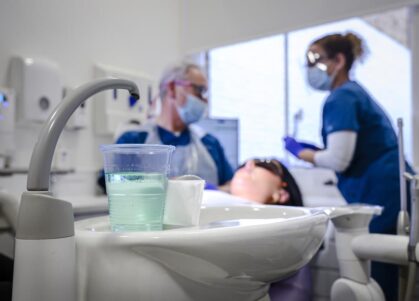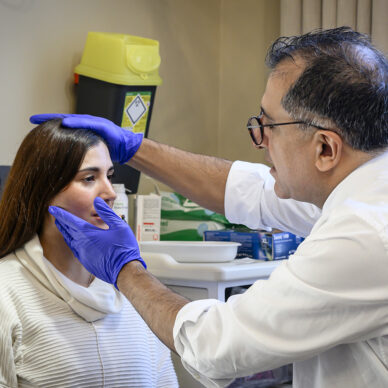A Personal Consultation
Impacted teeth can become infected, bringing pain and swelling, misaligned wisdom teeth make cleaning awkward, leading to decay, This can spread to other teeth, further risks include cysts, bone loss, nerve damage, or periodontitis.
A complete understanding of your current dental health is essential, to ensure all issues are treated. Part of a forward looking solution, along with decisions to be discussed on the best way to address any problematic wisdom teeth.
Your consultant will use scans, physical examination and their experience, to identify a likely growth path and judge the need for removal.
A tooth may be stuck, or fully impacted, your mouth unable to make sufficient room. Wisdom teeth which have broken through could be growing at an angle, liable to push against a nerve, or nearby teeth and cause damage.
One factor to bear in mind is that apart from the risk of direct damage, time acts against you. As you age, your jawbone changes and teeth may be more complex to extract, making other medical issues more likely.
If you have immediate problems with your wisdom teeth, removal may be the answer. Even removing apparently trouble free teeth in certain cases.
In a few situations, potential nerve damage needs thought before extraction and will be assessed by your consultant. An uncommon issue but if you are at risk, this can be discussed and preventative procedures adopted.
Whether extraction is needed will be a core point, symptoms could be temporary, or other treatment options be viable for a tooth likely to grow safely. Removal proving to be the best solution is still quite common.
There is no preset conclusion, you are welcome to read more on whether wisdom teeth should be extracted, which is a health based, individual decision.
Wisdom Tooth Removal
In most cases, wisdom tooth removal is not a major task, or likely to take too long. Local anaesthesia should be fine, which can be used in conjunction with intravenous sedation to reduce anxiety. General anaesthesia is also available.
An impacted wisdom tooth may require deeper surgery, to cut the gum and remove any bone above the tooth. This is again not too invasive, although stitches are likely to be required, self dissolving, or removed a week later.
A little bleeding is common after dental surgery, which can be stemmed with a gauze pad and gentle pressure if not stopping naturally. Rinsing with warm salt water for a few days will keep the area clean and help to avoid infection.
Depending on sedation choice, you may need to be driven home and take time off work, not a bad idea for the rest of the day if fully sedated.
You may feel a changed sensation, tingling, or numbness in your lips, tongue, or cheek. The nerves supplying them are close to your lower wisdom teeth, an aspect which is considered and the feeling is normally short term.
Care At Our London Clinic
We never rush you, or try to impose solutions you are not comfortable with. They should be joint decisions, based on understanding of why wisdom teeth exist and on your present, or future oral health needs.
Skilled assessment and understanding of related risk are critical to decisions on wisdom teeth. The reason we ensure that you see a consultant maxillofacial surgeon at stage one.
They will also carry out surgery required to remove any wisdom teeth. In dedicated facilities, at a London clinic with the finest equipment and safety procedures.
Every staff member you meet will understand your case and support our clinic’s ethos of personal care. If we can help with current, or potential wisdom tooth issues, please get in touch at any time.

